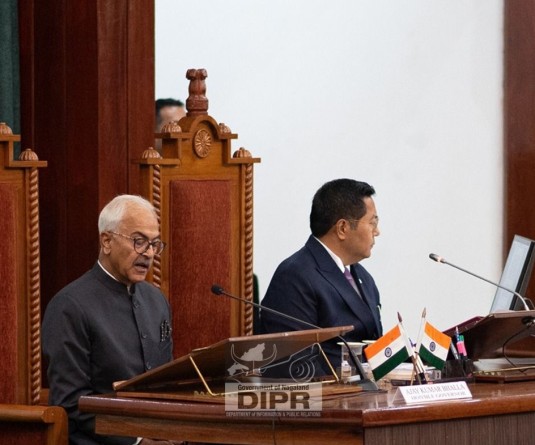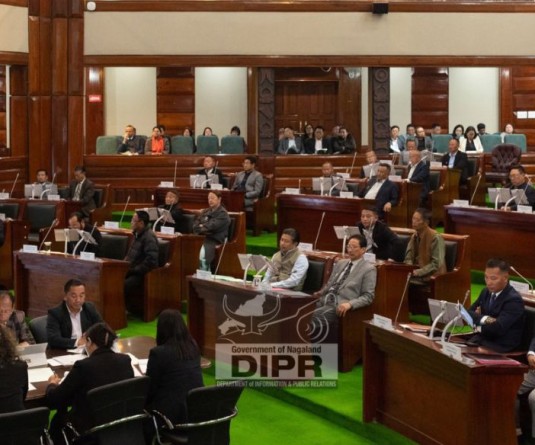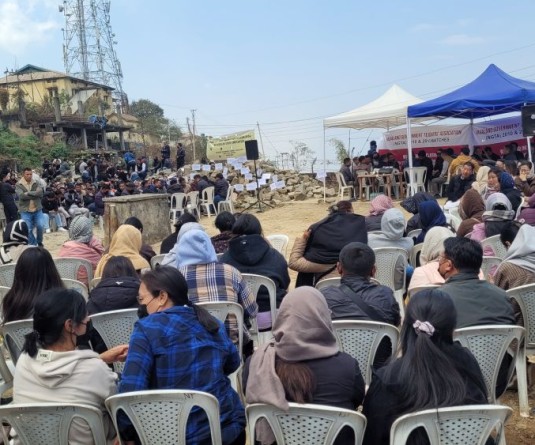
DIMAPUR, AUGUST 26 (MExN): A dialogue on Internally Displaced Persons (IDP) in India’s northeast region was the focal point of attention during the 3 days workshop on IDP organized by Mahanirban Calcutta Research Group (MCRG) in collaboration with the Naga Peoples Movement for Human Rights (NPMHR) held at Hotel Japfu, Kohima from 24-26 August 2006.
The participants (altogether 35) consisting of eminent personalities from myriad sectors such as socio-economic, cultural, political and women rights, policy experts on legal and international institutions and mechanism, media analyst, research scholars from various Universities in East and Northeast India including social and human rights activists came together to discuss and deliberate on IDPs induced by political and linguistic-cultural identities conflicts besides the state centric development programs and security policies.
During the discussions, it was felt that dialogues and efforts at accommodations and understandings have complimented war, conflicts and threatened peace. “It is with this realization that these dialogues were planned aiming to initiate and continue conversation among peace and human rights activists of the region and to evolve a functioning network of cooperation on the problems”, a statement issued after the end of the conclave pointed out.
Against this backdrop, the dialogue focused on issues such as cause of displacement, arrangement of humanitarian relief for IDPs particularly women and children, international/regional and national policies on IDPs, and of building a humanitarian network on IDPs.
Dr. Monirul Hussian, Professor of Political Science, Gauhati University presented the keynote address a (a draft) status report of IDPs in India’s northeast which was discussed. The meeting saw participation by President Naga Hoho, NSF representatives, independent observers apart from the members of NPMHR.
The dialogue concentrated on various sessions dealing on the IDP situation such as in the Bodo Territorial Council, Karbi Anglong, North Manipur Hills, situation in Nagaland, problem of statelessness, Dams and the appropriateness of the UN Guiding principles in Northeast India.
It was also observed that India’s Northeast had been a theatre of the longest state versus community in South Asia. “Different ethnic groups living in this region have been pressing for autonomy in various forms on the basis of political on the basis of political and linguistic –cultural identities or for constitutional safeguards of their respective existences. These claims of autonomy of different groups of people sharing the geographical space as well as natural resources have often worked at cross-purposes and have displaced many people. Similarly, different development programmes have also displaced quite a number of people in the region”, it stated.
The workshop also adopted a statement encouraging all state and non state actors to appreciate and acknowledge the role of civil societies in ushering dialogue, accommodation understanding in conflict situations, peace building and efforts towards raising humanitarian initiatives.
The Kohima Statement on IDP in India’s northeast further welcomed the peace initiative taken by MCRG in collaboration with NPMHR while at the same time expressing concern at the plight of IDPs in India’s northeast, induced by such factors as conflict, development, environmental degradation and government policies relating to land, development, economy, etc.
The statement also felt that the problems should be seen in a larger perspective and that Government of India must seriously and sincerely express there will to resolve it. It was also felt that there is no other way than to reactivate civil society initiatives to develop the spirit of understanding, tolerance and accommodation between peoples and organize peoples to people’s dialogue.
“The participants of the dialogue urge on the state and non state actors to recognize due importance of the civil society groups and initiatives. It also calls upon the Government to formulate a new people’s oriented right based resettlement and rehabilitation laws and policies in order to address the humanitarian crisis generated by displacement”, it was stated. Those who signed the Kohima statement included MCRG, NPMHR, ICSA, Naga Hoho, IFP, KSA, ASDC, GU, Panos South Asia, NWUM, Dolphin trust, NESRC, NCF, ICHR, NSF, ISSC, etc.
It may be mentioned that the MCRG has organized four civil society dialogues in 2001 (Kolkata), 2002 (Shantiniketan), 2003 (Shillong) and 2004 (Darjeeling) – the first three on “Human Rights and Peace”, and the fourth one on “Conflict, Autonomy and Peace”. In all these dialogues, there was a special emphasis on the situation in India’s East and Northeast. In continuation to these dialogues among the members of civil society, the MRCG organized the three days workshop in partnership with NPMHR.






